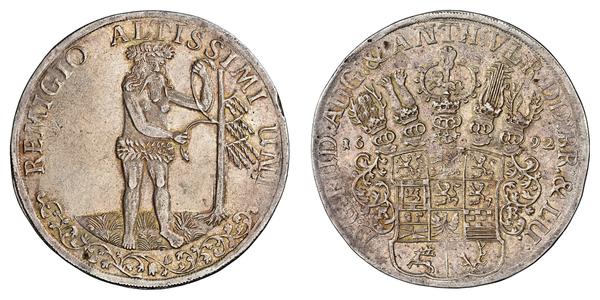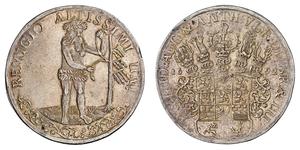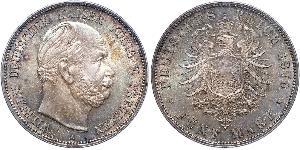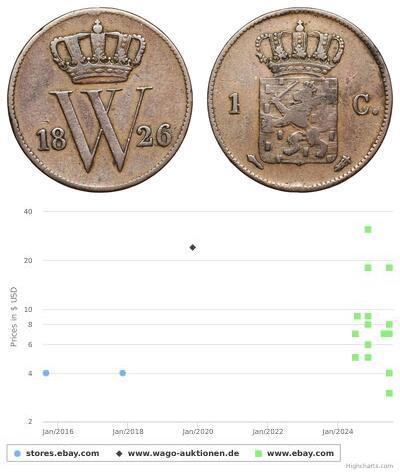1 Талер
1692, Brunswick-Wolfenbuttel, Rudolph Augustus & Anton Ulrich. Silver Thaler Coin. NGC AU55!
Mint Year: 1692
Denomination: Thaler
Mint Place: Zellerfeld
Mint Master: Rudolf Bornemann
Condition: Certified and graded by NGC as AU-55!
Reference: Davenport 6389, Welter 2071, KM-593. Very rare date, especially as a problem-free coin!
Weight: 29.14gm
Diameter: 45mm
Material: Silver
Obverse: Wildman standing right, bending branches of pine tree to his right. Floral decorative ornamentation below, motto around.
Legend REMIGIO ALTISSIMI UNI ("According to the will of the only Highest.")
Reverse: Foliiaged composite coat-of-arms of Brunswick-Wolfenbuttel, topped by five crested helmets. Date (16-92) split at sieds.
Legend: D : G : RUD : AUG : & ANTH : VLR : DD : BR : & LU :
The wild man (also wildman, or "wildman of the woods") is a mythical figure that appears in the artwork and literature of medieval Europe, comparable to the satyr or faun type in classical mythology and to Silvanus, the Roman god of the woodlands. The defining characteristic of the figure is its "wildness"; from the 12th century they were consistently depicted as being covered with hair. Images of wild men appear in the carved and painted roof bosses where intersecting ogee vaults meet in the Canterbury Cathedral, in positions where one is also likely to encounter the vegetal Green Man. The image of the wild man survived to appear as supporter for heraldic coats-of-arms, especially in Germany, well into the 16th century. Renaissance engravers in Germany and Italy were particularly fond of wild men, wild women, and wild families, with examples from Martin Schongauer (died 1491) and Albrecht Dürer (1471–1528) among others.
Rudolph Augustus (16 May 1627 – 26 January 1704), a member of the House of Welf, was Duke of Brunswick-Lüneburg and ruled as Prince of Brunswick-Wolfenbüttel from 1666 until his death. In 1685 he made his younger brother Anthony Ulrich co-ruler.
He was born in Hitzacker, then the residence of his father Duke Augustus the Younger of Brunswick-Lüneburg and his second wife Princess Dorothea of Anhalt-Zerbst. His father assumed the rule in the Principality of Brunswick-Wolfenbüttel, after his Welf cousin Duke Frederick Ulrich had died childless in 1634.
Rudolph Augustus succeeded his father as ruling Prince of Brunswick-Wolfenbüttel in 1666. More interested in his studies and hunting, he soon after appointed his politically astute younger brother Anthony Ulrich governor. In 1671 both besieged and finally occupied the city of Braunschweig, ending about 250 years of local autonomy.
During his reign, Rudolph Augustus concentrated on the Baroque expansion of his ducal residence, including the Alter Weg ("Old Way"), a road connecting the cities of Brunswick and Wolfenbüttel. He died in 1704 at the Hedwigsburg hunting lodge.
Anthony Ulrich (German: Anton Ulrich; 4 October 1633 – 27 March 1714), a member of the House of Welf, was Duke of Brunswick-Lüneburg and ruling Prince of Brunswick-Wolfenbüttel from 1685 until 1702 jointly with his elder brother Rudolph Augustus, and solely from 1704 until his death. He was one of the main proponents of enlightened absolutism among the Brunswick dukes.
Already his father consulted him in politics and the government business. After Augustus the Younger's death in 1666, Rudolph Augustus, Anthony Ulrich's elder brother, became reigning duke and made Anthony Ulrich his proxy. Rudolph Augustus had more interest in hunting and his library than in government affairs and left most decisions to his brother; in 1685, he officially made Anthony Ulrich a coregent with equal rights. The young prince united the forces of the Welf principalities to combat the rebellious City of Brunswick, whose citizens finally had to accept the ducal overlordship in 1671. In the following year, however, his main concern was the rivalry with his cousin Duke Ernest Augustus, who from 1679 ruled over the Brunswick Principality of Calenberg.
After the Ernest Augustus had received the new ninth prince-electorship from Emperor Leopold I in 1692 and went on to rule as Elector of Hanover, tensions between the two states rose, as both Anthony Ulrich and Rudolph Augustus were dismayed that they had not received the electorship according to the right of primogeniture. While both Hanover under Ernest Augustus' son Elector George Louis and the Welf Principality of Lüneburg sided with the Habsburg emperor in the War of the Spanish Succession, Anthony Ulrich decided to enter into an agreement with King Louis XIV of France. This led to Hanover and Lüneburg forces invading the Principality of Wolfenbüttel in March 1702; Anthony Ulrich was almost captured while travelling from his Wolfenbüttel residence to Brunswick. By order of the emperor, Anthony Ulrich was deposed as duke against his brother's protestations, and Rudolph Augustus remained as the only Wolfenbüttel ruler, while Anthony Ulrich fled to Saxe-Gotha. In April 1702, Rudolph Augustus signed a treaty with Hanover and Lüneburg that Anthony Ulrich later agreed to.
After Rudolph Augustus' death in 1704, Anthony Ulrich took over government again. He continued to settle various disputes with his Hanover cousin George Louis, who in 1705 also inherited Lüneburg, until a final agreement between the two sister principalities was reached in 1706. Wolfenbüttel also renounced all claims to the former Ascanian duchy of Saxe-Lauenburg and received several smaller estates in compensation.
It was now Anthony Ulrich's turn to approach the Imperial Habsburg dynasty. In 1704, he had concluded an agreement with his cousin Wilhelmine Amalia of Brunswick-Lüneburg, wife of the future Emperor Joseph I, to marry his granddaughter Elisabeth Christine off to Joseph's brother Archduke Charles of Austria. The young woman was reluctant to convert to the Catholic faith, which she finally did in a solemn ceremony at Bamberg Cathedral on 1 May 1707. The marriage took place the next year in Vienna.
In 1709, Anthony Ulrich himself converted to the Catholic Church. He guaranteed to his subjects that this would not influence his government, although he allowed the consecration of the first Catholic church in Brunswick. He lived to see the election of Archduke Charles as Emperor Charles VI in 1711 and also the marriage of his granddaughter Charlotte Christine with Alexei Petrovich Romanov, son of Tsar Peter I, in the same year.
He died at the age of 80 at his Schloss Salzdahlum residence, which he had built, and was buried in the crypt of the Wolfenbüttel Marienkirche. He was succeeded by his eldest surviving son, Augustus William.
As an admirer of King Louis XIV of France, Anthony Ulrich is known as a supporter of scholarship and the arts. He introduced the French language at the Wolfenbüttel court and often spent enormous sums on cultural events and amusements. From 1689 to 1690, he had a public opera house erected in Brunswick, Staatstheater Braunschweig, which soon became a venue for Baroque composers such as Johann Rosenmüller, Johann Sigismund Kusser, Reinhard Keiser, Georg Caspar Schürmann, and Johann Adolph Hasse.
He significantly extended the Bibliotheca Augusta, a library founded by his father. He hired the philosopher Leibniz as a librarian, and was a supporter of Anton Wilhelm Amo, the first black Doctor of Philosophy in Europe. The new rotunda of the Bibliotheca Augusta, built according to plans by Hermann Korb and completed in 1712, was the first genuine library building in Germany. Hermann Korb also designed the plans for Schloss Salzdahlum which was erected between 1694 and 1695, modelled on the French Château de Marly. Here the Prussian crown prince Frederick II married Elisabeth Christine of Brunswick-Wolfenbüttel-Bevern in 1733.
Anthony Ulrich also was a writer and had a large art collection, which later became the foundation of the Herzog Anton Ulrich Museum (Duke Anthony Ulrich Museum). His sister Sibylle Ursula wrote part of a novel, Die Durchlauchtige Syrerin Aramena (Aramena, the noble Syrian lady), which when complete would be the most famous courtly novel in German Baroque literature; it was finished by Anthony Ulrich and edited by Sigmund von Birken.

|
Добавив:
anonymous 2023-10-31 |
|
||
|
||
|
||
|
||
1/2 Цент Королівство Нідерланди (1815 - ) Мідь Віллем III
в групі 10 монет / 10 цін
⇑




 English
English





-300-150-ZwusHgTycaAAAAGPadNVj7Mq.jpg)






